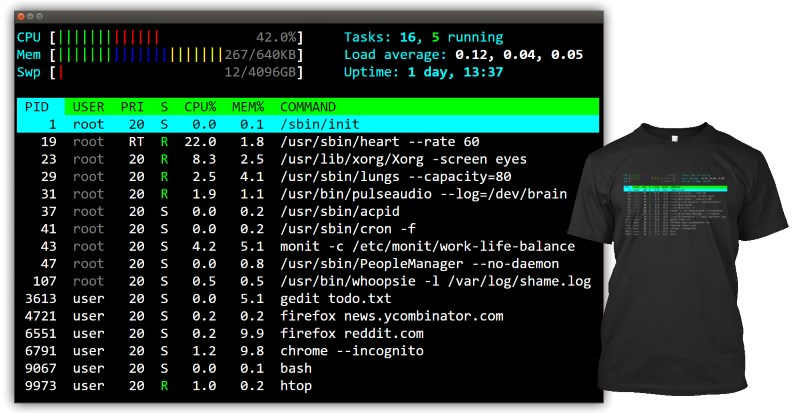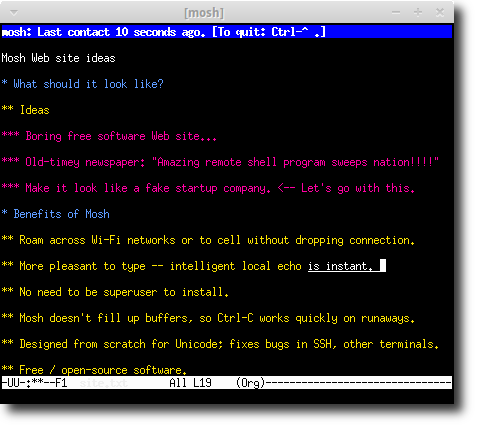132 private links
Virtual Hard Disk (VHD) is a disk image file format which represents a virtual hard disk drive, capable of storing the complete contents of a physical hard drive.
A video registration of a presentation at the Linux Fest NW.
Pretty ironic and funny.
nnn is probably the fastest and most resource-sensitive file manager you have ever used. It integrates seamlessly with your DE and favourite GUI utilities, has a unique navigate-as-you-type mode with auto-select, disk usage analyzer mode, bookmarks, contexts, application launcher, familiar navigation shortcuts, subshell spawning and much more.
Integrate utilities like sxiv or fzy easily, or use it as a (neo)vim plugin; nnn supports as many scripts as you need!
Alpine Linux-based Docker images are small, but they can still bloat up quickly. If you're concerned about image size, search for alternatives, like Minideb.
When the Docker revolution started, one argument among many in favor of using containers instead of virtual machines was their size. Container images were supposed to be small.
However, several anti-patterns quickly emerged in the early days of Docker. First, most people wanted to treat containers just like VMs, hence they wanted an SSH server in them, they wanted to run multiple processes in them and they wanted their regular Linux distributions.
This quickly ballooned the size of Docker images that could be pulled from the Docker Hub. Official Ubuntu and CentOS images used to be above 600 MB. Once dependencies and application code got added, it was not rare to see several GB Docker images around.
For the longest time I did not know what everything meant in htop.
I thought that load average 1.0 on my two core machine means that the CPU usage is at 50%. That's not quite right. And also, why does it say 1.0?
I decided to look everything up and document it here.
They also say that the best way to learn something is to try to teach it.

Linux offers a number of tools for examining your running processes. With the applications shown below, you can find out which applications are eating all your memory and which files are attached to those rogue programs. Or you can just get a global view of how your system is performing.
Regardless of your specific level of interest, this tutorial will offer you a starting point on that journey.
- top
- iotop
- monit
- lsof
- ps_mem
xclip is a command line utility that is designed to run on any system with an X11 implementation.
xclip provides an interface to X selections ("the clipboard") from the command line. It can read data from standard in or a file and place it in an X selection for pasting into other X applications. xclip can also print an X selection to standard out, which can then be redirected to a file or another program.
Sharing files can be a pain. The larger the file is, the more difficulty it inevitably creates. If you want those files kept private, you're in for a real nightmare. Well, not exactly.
Onionshare is a relatively new application that allows you to share files of any size securely and relatively anonymously over the Tor network without the need for a "midde-man" website. It's completely free and open source, and it's actually easy for anyone to use.
How many times have you repeatedly typed out a long command on the command line and wished there was a way to save it for later? This is where Bash aliases come in handy. They allow you to condense long, cryptic commands down to something easy to remember and use. Need some examples to get you started? No problem!
Autotrash is a command line to automatically purge old trashed files and it never allows your trash folder to grow too big in Linux.
Phoronix is the leading technology website for Linux hardware reviews, open-source news, Linux benchmarks, open-source benchmarks, and computer hardware tests.
Liquid Prompt gives you a nicely displayed prompt with useful information when you need it. It shows you what you need when you need it.
You will notice what changes when it changes, saving time and frustration. You can even use it with your favorite shell – Bash or zsh.
Liquid Prompt gives you a nicely displayed prompt with useful information when you need it. It shows you what you need when you need it.
You will notice what changes when it changes, saving time and frustration. You can even use it with your favorite shell – Bash or zsh.
There are countless number of terminal based games on Linux, but in this article, we shall look at some of the most interesting command-line games for Linux.
Features:
- Cross-platform support for Linux and Mac
- Automation (so there's no need to remember to click "backup")
- Point-in-time recovery (or something close) so if you accidentally delete a file but don't notice until later, it's still recoverable
- Low cost
- Replicated data store for backup sets, so data exists in more than one place (i.e., not just backing up to a local USB drive)
- Encryption in case the backup files fall into the wrong hands
FSearch is a fast file search utility for GNU/Linux operating systems, inspired by Everything Search Engine. It’s written in C and based on GTK+3.

Features
- Instant (as you type) results
- RegEx support
- Wildcard support
- Filter support (only search for files, folders or everything)
- Fast sort by filename, path, size or modification time
- Include and exclude specific folders to be indexed
- Ability to exclude certain files/folders from index using wildcard expressions
- Customizable interface
Screen is a command-line tool that lets you set up multiple terminal windows within it, detach them and reattach them later, all without any graphical interface. This program has existed since before I started using Linux, but first I clearly need to address the fact that I'm even using Screen at all prior to writing a tech tip about it.
So now that those arguments are out of the way, I thought those of you still using Screen might find it useful to learn how to do copy and paste within Screen itself.
Mobile shell that supports roaming and intelligent local echo. Like SSH secure shell, but allows mobility and more responsive and robust.

Building command line tools in Bash is an extremely tedious and somewhat enigmatic task. There's quite a bit of boilerplate code you're going to have to write if you want your script to do more than just one thing, which will only clutter your script. In addition, your scripts will likely never be able to reference good code you've written from old scripts.
Ash helps you get rid of all of your boilerplate by letting you call functions directly from the command line, while also providing a modular approach to scripting which will allow you to share code between scripts.
You are able to build a module independently that functions as a CLI or as a library (or any combination of the two), and easily share your module with the world.
TimeShift for Linux is an application that provides functionality similar to the System Restore feature in Windows and the Time Machine tool in Mac OS. TimeShift protects your system by taking incremental snapshots of the file system at regular intervals. These snapshots can be restored at a later date to undo all changes to the system.
Snapshots are taken using rsync and hard-links. Common files are shared between snapshots which saves disk space. Each snapshot is a full system backup that can be browsed with a file manager.
TimeShift is similar to applications like rsnapshot, BackInTime and TimeVault but with different goals. It is designed to protect only system files and settings. User files such as documents, pictures and music are excluded. This ensures that your files remains unchanged when you restore your system to an earlier date. If you need a tool to backup your documents and files please take a look at the excellent BackInTime application which is more configurable and provides options for saving user files.

